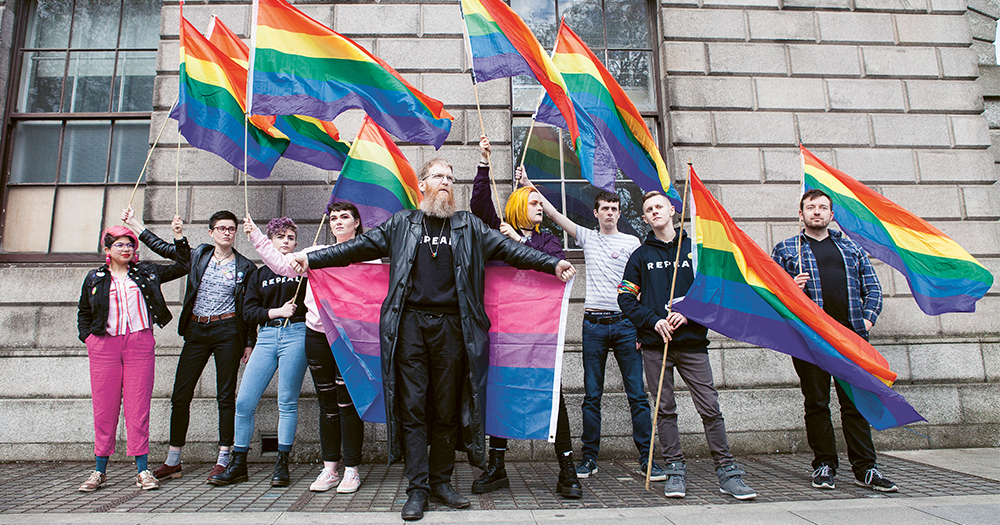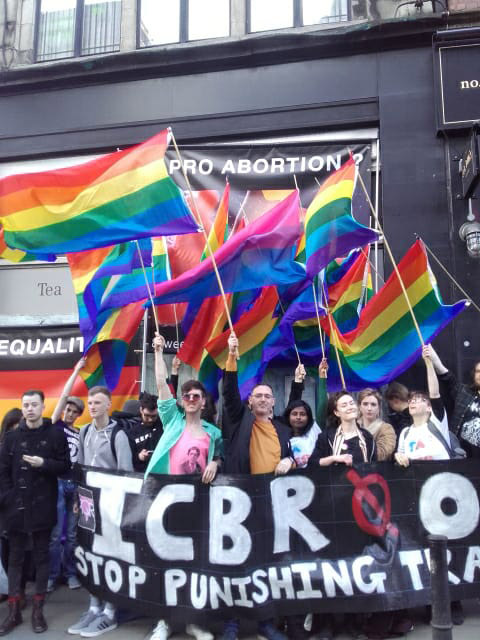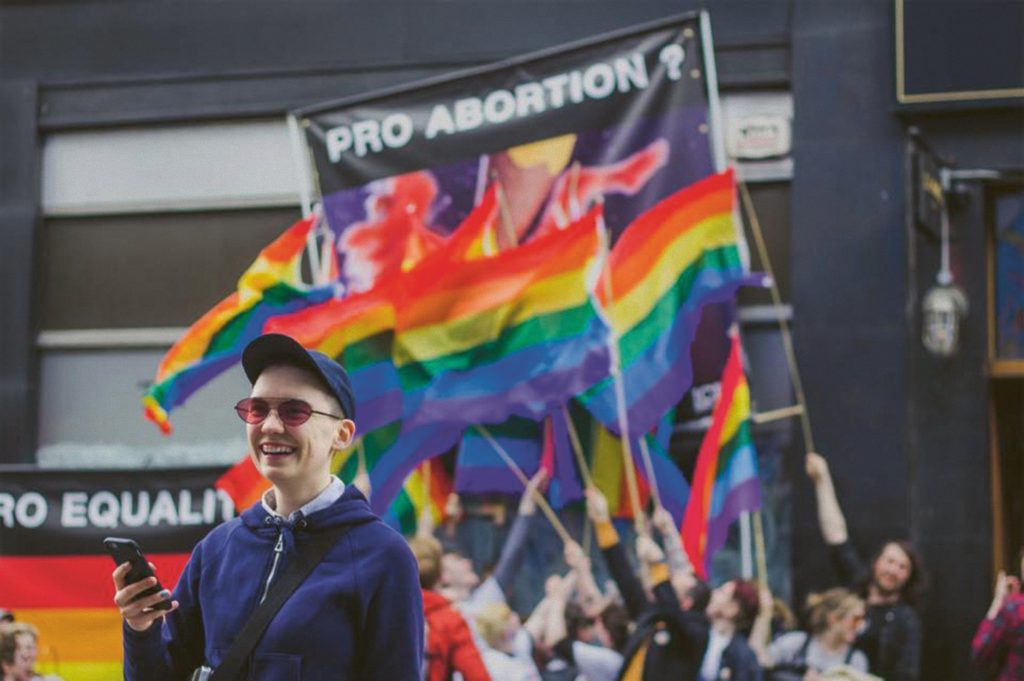In the weeks leading up to the referendum on whether the country should repeal the Eighth Amendment, the public has seen an influx of advertisements and promotional material from both sides. In some cases, the No side has been accused of dirty tactics and spreading misinformation. One of the pro-life groups, the Irish Centre for Bio-Ethical Reform (ICBR), have travelled around the city, brandishing large, graphic posters and banners showing what they purport to be a foetus during an abortion procedure.
Last month ICBR announced they would target queer spaces due to the support of the LGBT+ community for the repeal movement, beginning with the offices of GCN. At the next queer ICBR demonstration location, Pantibar, a group of young protesters suddenly turned up, peacefully blocking the graphic imagery with their own banners and rainbow flags. These people are the core membership of Radical Queers Resist (RQR).
The support for and from the queer community grew from there. RQR continue to turn up at ICBR demonstrations, shielding the public from the disturbing imagery.
LU and J spoke to me about the movement, preferring to use initials instead of full names. As J says: “It’s not that we don’t want to give our names, it’s that we want everyone to feel like they can be part of the group, that we don’t have a hierarchy. We don’t want to push our careers or anything like that. We really just want to make some change.
“We’re a little group who wanted to take more direct action, not having to think about our tone or to keep calm. We wanted to act on how we actually felt, what we wanted to change. Repeal was one of the issues.”
RQR, who hail from Maynooth University, also fight to end Direct Provision, to make PrEP more accessible, for better trans healthcare, and for queer mental health services.
Re-traumatising People Who Have Suffered Tragedy
The group first encountered ICBR on International Women’s day.
“Last month ICBR announced they would target queer spaces due to the support of the LGBT+ community for the repeal movement, beginning with the offices of GCN.”
“It was Strike For Repeal and the ICBR were following the Rosa repeal bus around the country,” J explains. “They came to our campus. I know students would have had abortions, so seeing them there and how upset everyone was, we knew we had to cover that stuff up. They are re-traumatising people who have already suffered tragedy.
“It’s important people know there are others out there who do have compassion and do understand that your experiences are your own, and you don’t have to say anything to anybody about your own personal choice.
“And then ICBR announced they were going to directly target LGBTQ spaces, so we said ‘Fuck no’.”
Since then, RQR has not only protested outside queer spaces targeted by ICBR.
“It’s developed into an on-call kind of thing,” says LU. “Like, ‘Who you gonna call – Rad Queers’. Wherever they are, we’ve gotten messages saying, ‘Hey guys, we need someone to help us here,’ and it’s crazy because we’re just five little queers.”
LU speaks about the danger of ICBR’s tactics, which have expanded to demonstrations outside maternity hospitals.
“The images are really graphic. No matter what kind of medical procedure you’re having, you don’t want to walk into a hospital and see posters of heart surgery being performed at the entrance. Imagine if you’ve gotten bad news, or had a miscarriage or just had a baby, you don’t want to see a graphic image of that. Some people have said, ‘If you don’t want to see this, then why are you pro-abortion?’ It’s not about being pro-abortion; it’s being pro-giving people a choice to have a right over their bodies.”
LU describes RQR’s methods as: “Silent protest. We ignore and protect. We show up, cover the images up and don’t interact. We’re not trying to be violent, we’re not trying to cause harm to anybody. That’s the opposite of what we are trying to do.”
J is firm on this point. “We’re there to protect people. The ICBR will be in your ear, trying to intimidate you and make you question your own beliefs. For example, a friend was protesting and I was just checking in, asking her was she okay. A person from ICBR said to me: ‘You’re asking a woman if she’s okay – do you not think she can stand for herself? Do you think women are weak?’ It’s such a warped logic and strange tactic.”
“We’re not trying to be violent, we’re not trying to cause harm to anybody. That’s the opposite of what we are trying to do.”
When asked if there was a sense of complacency in the queer community following the success of the marriage referendum, J speaks of travelling to one of the protests and how it felt carrying the Pride flag. “It was the first time in a very long time that I felt the Pride flag and the rainbow colours meant protest and meant resistance. Because, for a long time it’s just meant capitalism to me, and allies looking for a pat on the back.”
LU agrees. “Rainbow capitalism has made it really difficult, especially with the marriage referendum. A lot of issues were pushed under the rug to make it easily digestible, which is also the case with the referendum now. I understand in a lot of cases it makes it easier, but it erases a lot of us. I’m a migrant, I am a queer person, I have a womb, I can get pregnant; I am affected by marriage laws. There are very few non-binary voices being brought up. And it’s not like there aren’t many of us.”
Public support for RQR has grown with their continuing, visible presence.
According to J: ‘When we show up people are like, ‘Are you Radical Queers? We saw you online and we wanted to help – we brought this bedsheet [to help block ICBR’s posters], can we buy you a coffee?’ So knowing that people are really affected and appreciate you being there, makes you feel really good.”
Find out more about Radical Queers Resist at their Facebook page
This article originally appeared in Issue 342 of GCN, read here.
© 2018 GCN (Gay Community News). All rights reserved.


